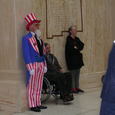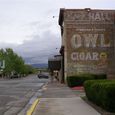« Tell The Truth | Main | Important Town Hall Meeting on Raising Statewide Minimum Wage »
Monday, November 14, 2005
NM Election Officials Try to Block Machine Inspections
Editor's Note: The Brad Blog, a national website, covered this story last week and includes a long comment thread debating the issues. Also, a recent article in Scoop Independent News provides a comprehensive look at the voting problems New Mexico experienced in the 2004 election. Perhaps most damning, a recent report from the highly respected, nonpartisan Government Accountability Office (GAO) confirms concerns about the security of electronic voting machines.
Voter Action New Mexico Update 11/08/05:
In the past week, two New Mexico election officials refused to allow the voter plaintiffs in the case of Patricia Rosas Lopategui v. Rebecca Vigil-Giron, et al. to conduct meaningful inspections of their electronic voting machines. This despite clear indications that there were serious problems in last year’s presidential election with these same machines, which do not produce a voter-verifiable and auditable paper record.
Bernalillo County Clerk Mary Herrera has given no explanation for her sudden, flat refusal to permit any inspection after weeks of discussions between plaintiffs’ attorneys and attorneys for the county. Plaintiffs have sworn statements from Bernalillo County voters who tried to vote on the county’s paperless touchscreen voting machines, manufactured by Sequoia Voting Systems, and whose votes were switched before their eyes from the candidate they supported to a different candidate. Plaintiffs also have evidence that the County’s widespread use of another type of paperless machine, the Shoup 1242, resulted in the erasure of votes that citizens tried to cast for presidential candidates.
San Juan County Clerk Fran Hanhardt permitted limited inspection of her county’s voting machines. She would not, however, open the voting machines to permit plaintiffs’ experts to examine their components. The experts included Dr. David Dill, a computer science professor from Stanford University with extensive knowledge of electronic voting machine issues. The reason? Doing so would void the County’s warranty from the manufacturer, Election Systems and Software (ES&S).
Ms. Hanhardt also refused to allow plaintiffs’ experts to examine or copy electronic files containing the results of the November 2004 presidential election that were stored in the machines’ “redundant memories.” The reason? The machines store the results of public elections in a secret, proprietary format that ES&S claims as its private property. According to Ms. Hanhardt, allowing plaintiffs’ experts to see those results in their original form would violate the county’s contract with ES&S, which prohibits disclosure of proprietary information.
However, plaintiffs’ experts did cast votes in simulated voting on two touchscreen machines, and noted several anomalies. Several times when they tried to vote for a candidate, the “X” appeared instead in the adjacent box for a different candidate. Once when boxes for two candidates were pressed at the same time, neither registered a vote but an “X” appeared in the box of a third candidate between them. In addition, the experts were able to cast ballots that contained no votes whatsoever, something the County Clerk and her staff had told them the machines would not permit. They did this by first selecting the “straight party” option, which marked votes for every candidate of the selected party on the ballot. Next, they pressed the boxes for each of the party’s individual candidates, which erased those votes. Finally, they pressed the “Vote” button, and the screen notified them that they had successfully voted
The right to select our governmental representatives in free, fair and transparent elections is the foundation of our democracy. Before electronic voting, candidates, political parties and ordinary citizens had the right to monitor and observe every step of the election process. Unfortunately, that is no longer the case.
Neither unreasonably broad warranty restrictions nor the intellectual property claims of private corporations should trump the public’s right to know exactly how their votes are recorded and counted. Elections officials should not be able to contract away this right when they buy voting machines. They should not be able to hide behind contracts with private companies to avoid having a bright light shown on the inner workings of the paperless electronic voting machines. Unless and until everything about how these machines work is open to public scrutiny, voters are being asked to take it on faith that electronic voting is accurate, reliable and secure. With everything that is known in other fields about the prevalence of programming errors, software bugs, and hacking where computers are concerned, that is asking too much.
What comes next? The attorneys for the plaintiffs will ask the court to order the defendants to permit full inspections of the voting machines. They will also proceed to amass more evidence by taking depositions of witnesses from public elections agencies and the private voting machine companies.
Let us know what YOU think info@voteraction.org. Voter Action is a project of the International Humanities Center. www.voteraction.org
November 14, 2005 at 09:33 AM in Local Politics | Permalink
Comments
awful situation with nm democrats being in the way of finding the truth. they should be helping to push for the truth.
Posted by: | Nov 14, 2005 3:25:11 PM
Is it time to stop supporting Dems who do things like this? It gets my goat. What are they afraid of? You have Dean urging Republicans to TELL THE TRUTH and yet we have NM Dems who seem to be covering up the truth.
Posted by: Old Dem | Nov 14, 2005 5:53:21 PM














































